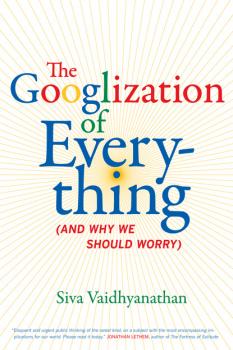ТОП просматриваемых книг сайта:
Siva Vaidhyanathan
Список книг автора Siva VaidhyanathanАннотация
Copyright reflects far more than economic interests. Embedded within conflicts over royalties and infringement are cultural values—about race, class, access, ownership, free speech, and democracy—which influence how rights are determined and enforced. Questions of legitimacy—of what constitutes “intellectual property” or “fair use,” and of how to locate a precise moment of cultural creation—have become enormously complicated in recent years, as advances in technology have exponentially increased the speed of cultural reproduction and dissemination.In Copyrights and Copywrongs , Siva Vaidhyanathan tracks the history of American copyright law through the 20th century, from Mark Twain’s vehement exhortations for “thick” copyright protection, to recent lawsuits regarding sampling in rap music and the “digital moment,” exemplified by the rise of Napster and MP3 technology. He argues persuasively that in its current punitive, highly restrictive form, American copyright law hinders cultural production, thereby contributing to the poverty of civic culture.In addition to choking cultural expression, recent copyright law, Vaidhyanathan argues, effectively sanctions biases against cultural traditions which differ from the Anglo-European model. In African-based cultures, borrowing from and building upon earlier cultural expressions is not considered a legal trespass, but a tribute. Rap and hip hop artists who practice such “borrowing” by sampling and mixing, however, have been sued for copyright violation and forced to pay substantial monetary damages. Similarly, the oral transmission of culture, which has a centuries-old tradition within African American culture, is complicated by current copyright laws. How, for example, can ownership of music, lyrics, or stories which have been passed down through generations be determined? Upon close examination, strict legal guidelines prove insensitive to the diverse forms of cultural expression prevalent in the United States, and reveal much about the racialized cultural values which permeate our system of laws. Ultimately, copyright is a necessary policy that should balance public and private interests but the recent rise of “intellectual property” as a concept have overthrown that balance. Copyright, Vaidhyanathan asserts, is policy, not property.Bringing to light the republican principles behind original copyright laws as well as present-day imbalances and future possibilities for freer expression and artistic equity, this volume takes important strides towards unraveling the complex web of culture, law, race, and technology in today's global marketplace.
Аннотация
In the beginning, the World Wide Web was exciting and open to the point of anarchy, a vast and intimidating repository of unindexed confusion. Into this creative chaos came Google with its dazzling mission—"To organize the world’s information and make it universally accessible"—and its much-quoted motto, «Don’t be evil.» In this provocative book, Siva Vaidhyanathan examines the ways we have used and embraced Google—and the growing resistance to its expansion across the globe. He exposes the dark side of our Google fantasies, raising red flags about issues of intellectual property and the much-touted Google Book Search. He assesses Google’s global impact, particularly in China, and explains the insidious effect of Googlization on the way we think. Finally, Vaidhyanathan proposes the construction of an Internet ecosystem designed to benefit the whole world and keep one brilliant and powerful company from falling into the «evil» it pledged to avoid.
Аннотация
In the beginning, the World Wide Web was exciting and open to the point of anarchy, a vast and intimidating repository of unindexed confusion. Into this creative chaos came Google with its dazzling mission—"To organize the world’s information and make it universally accessible"—and its much-quoted motto, «Don’t be evil.» In this provocative book, Siva Vaidhyanathan examines the ways we have used and embraced Google—and the growing resistance to its expansion across the globe. He exposes the dark side of our Google fantasies, raising red flags about issues of intellectual property and the much-touted Google Book Search. He assesses Google’s global impact, particularly in China, and explains the insidious effect of Googlization on the way we think. Finally, Vaidhyanathan proposes the construction of an Internet ecosystem designed to benefit the whole world and keep one brilliant and powerful company from falling into the «evil» it pledged to avoid.



